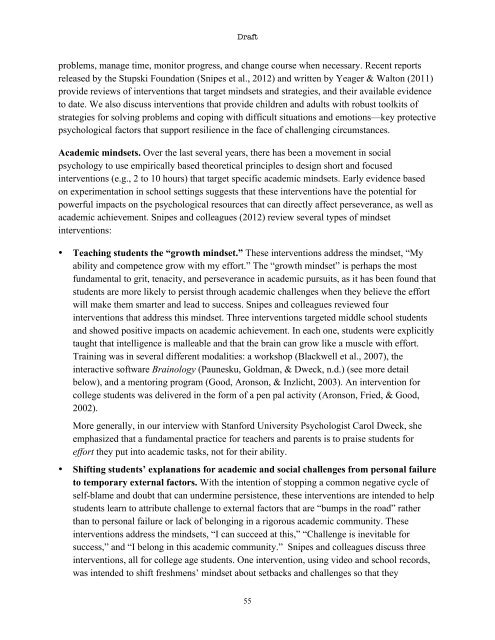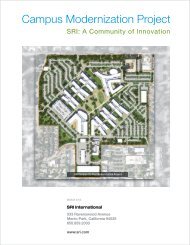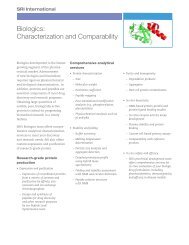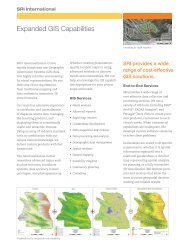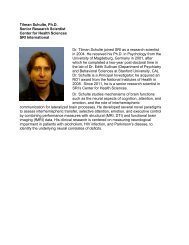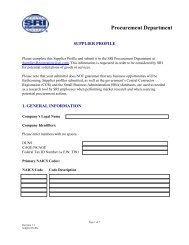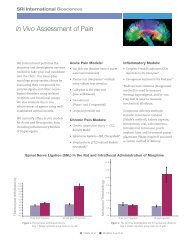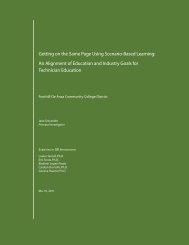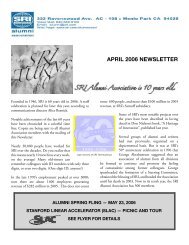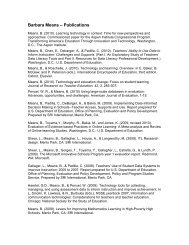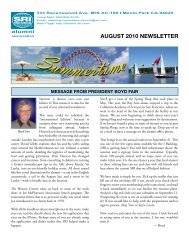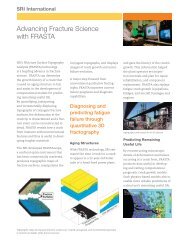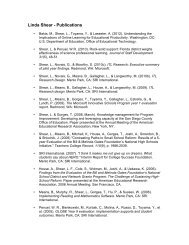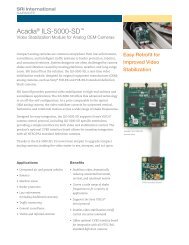Promoting Grit, Tenacity, and Perseverance - U.S. Department of ...
Promoting Grit, Tenacity, and Perseverance - U.S. Department of ...
Promoting Grit, Tenacity, and Perseverance - U.S. Department of ...
Create successful ePaper yourself
Turn your PDF publications into a flip-book with our unique Google optimized e-Paper software.
Draft<br />
problems, manage time, monitor progress, <strong>and</strong> change course when necessary. Recent reports<br />
released by the Stupski Foundation (Snipes et al., 2012) <strong>and</strong> written by Yeager & Walton (2011)<br />
provide reviews <strong>of</strong> interventions that target mindsets <strong>and</strong> strategies, <strong>and</strong> their available evidence<br />
to date. We also discuss interventions that provide children <strong>and</strong> adults with robust toolkits <strong>of</strong><br />
strategies for solving problems <strong>and</strong> coping with difficult situations <strong>and</strong> emotions—key protective<br />
psychological factors that support resilience in the face <strong>of</strong> challenging circumstances.<br />
Academic mindsets. Over the last several years, there has been a movement in social<br />
psychology to use empirically based theoretical principles to design short <strong>and</strong> focused<br />
interventions (e.g., 2 to 10 hours) that target specific academic mindsets. Early evidence based<br />
on experimentation in school settings suggests that these interventions have the potential for<br />
powerful impacts on the psychological resources that can directly affect perseverance, as well as<br />
academic achievement. Snipes <strong>and</strong> colleagues (2012) review several types <strong>of</strong> mindset<br />
interventions:<br />
• Teaching students the “growth mindset.” These interventions address the mindset, “My<br />
ability <strong>and</strong> competence grow with my effort.” The “growth mindset” is perhaps the most<br />
fundamental to grit, tenacity, <strong>and</strong> perseverance in academic pursuits, as it has been found that<br />
students are more likely to persist through academic challenges when they believe the effort<br />
will make them smarter <strong>and</strong> lead to success. Snipes <strong>and</strong> colleagues reviewed four<br />
interventions that address this mindset. Three interventions targeted middle school students<br />
<strong>and</strong> showed positive impacts on academic achievement. In each one, students were explicitly<br />
taught that intelligence is malleable <strong>and</strong> that the brain can grow like a muscle with effort.<br />
Training was in several different modalities: a workshop (Blackwell et al., 2007), the<br />
interactive s<strong>of</strong>tware Brainology (Paunesku, Goldman, & Dweck, n.d.) (see more detail<br />
below), <strong>and</strong> a mentoring program (Good, Aronson, & Inzlicht, 2003). An intervention for<br />
college students was delivered in the form <strong>of</strong> a pen pal activity (Aronson, Fried, & Good,<br />
2002).<br />
More generally, in our interview with Stanford University Psychologist Carol Dweck, she<br />
emphasized that a fundamental practice for teachers <strong>and</strong> parents is to praise students for<br />
effort they put into academic tasks, not for their ability.<br />
• Shifting students’ explanations for academic <strong>and</strong> social challenges from personal failure<br />
to temporary external factors. With the intention <strong>of</strong> stopping a common negative cycle <strong>of</strong><br />
self-blame <strong>and</strong> doubt that can undermine persistence, these interventions are intended to help<br />
students learn to attribute challenge to external factors that are “bumps in the road” rather<br />
than to personal failure or lack <strong>of</strong> belonging in a rigorous academic community. These<br />
interventions address the mindsets, “I can succeed at this,” “Challenge is inevitable for<br />
success,” <strong>and</strong> “I belong in this academic community.” Snipes <strong>and</strong> colleagues discuss three<br />
interventions, all for college age students. One intervention, using video <strong>and</strong> school records,<br />
was intended to shift freshmens’ mindset about setbacks <strong>and</strong> challenges so that they<br />
55


